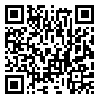Volume 4, Issue 1 (Spring and Summer 2018)
JMIS 2018, 4(1): 30-38 |
Back to browse issues page
Download citation:
BibTeX | RIS | EndNote | Medlars | ProCite | Reference Manager | RefWorks
Send citation to:



BibTeX | RIS | EndNote | Medlars | ProCite | Reference Manager | RefWorks
Send citation to:
sedghi S, abdi F, panahi S. Measuring the Information Literacy Level of Postgraduate Students of the Faculty of Rehabilitation Sciences of Iran University of Medical Sciences based on the Eisenberg Model. JMIS 2018; 4 (1) :30-38
URL: http://jmis.hums.ac.ir/article-1-147-en.html
URL: http://jmis.hums.ac.ir/article-1-147-en.html
2. Department of Medical Library and Information Sciences, Faculty of Management and Medical Information, Iran University of Medical Sciences, Tehran, Iran.
Abstract: (6573 Views)
Aim: Given the increasing amount of information, every individual needs to acquire skills and abilities beyond traditional literacy. The purpose of this study is to investigate the level of information literacy among students of rehab field.
Methods: This applied study was conducted on 150 graduate students of the Faculty of Rehabilitation Sciences of Iran University of Medical Sciences. The data collection tool was a standard questionnaire based on the Eisenberg model. The reliability of the questionnaire was calculated with Cronbach's alpha of 0.96%. SPSS software, descriptive statistics and inferential statistics were used to analyze the data.
Results: The knowledge of the research community in understanding the information needs was at the average level (problem recognition) with a mean score of 2.94, in search strategies with an average score of 2.96, in the location of information with an average score of 2.80, 2, in the combination of information with a mean of 2.46 and in the evaluation of information with an average of 2.93. The overall results of the study indicated the average literacy of graduate students with an average of 2.856 ± 0.636. Results showed that there is a significant relationship between the educational level of MS and Ph.D.
Conclusion: Since the status of the information literacy level of the research community was at an intermediate level, more attention should be paid to educating information literacy through conducting classes with richer content and according to new technologies among students in every field of rehabilitation. It is also necessary to use information specialists to review the functions and educational policies to advance the student research process.
Methods: This applied study was conducted on 150 graduate students of the Faculty of Rehabilitation Sciences of Iran University of Medical Sciences. The data collection tool was a standard questionnaire based on the Eisenberg model. The reliability of the questionnaire was calculated with Cronbach's alpha of 0.96%. SPSS software, descriptive statistics and inferential statistics were used to analyze the data.
Results: The knowledge of the research community in understanding the information needs was at the average level (problem recognition) with a mean score of 2.94, in search strategies with an average score of 2.96, in the location of information with an average score of 2.80, 2, in the combination of information with a mean of 2.46 and in the evaluation of information with an average of 2.93. The overall results of the study indicated the average literacy of graduate students with an average of 2.856 ± 0.636. Results showed that there is a significant relationship between the educational level of MS and Ph.D.
Conclusion: Since the status of the information literacy level of the research community was at an intermediate level, more attention should be paid to educating information literacy through conducting classes with richer content and according to new technologies among students in every field of rehabilitation. It is also necessary to use information specialists to review the functions and educational policies to advance the student research process.
Type of Study: Research |
Subject:
Special
Received: 2018/02/7 | Accepted: 2018/05/5 | Published: 2018/09/17
Received: 2018/02/7 | Accepted: 2018/05/5 | Published: 2018/09/17
Send email to the article author
| Rights and permissions | |
 |
This work is licensed under a Creative Commons Attribution-NonCommercial 4.0 International License. |





 hums.ac.ir
hums.ac.ir